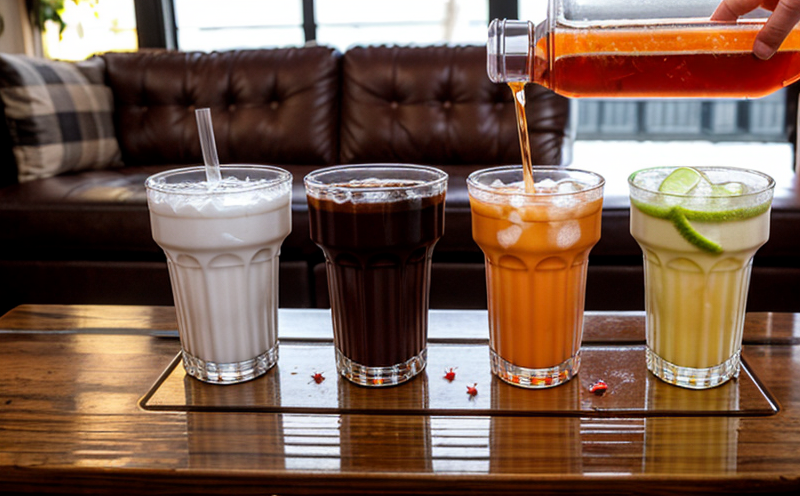ASTM E1871 Moisture Content Determination in Beverages
The ASTM E1871 standard provides a precise method for determining moisture content in beverages using Karl Fischer titration. This technique is widely recognized for its accuracy and reliability, making it an indispensable tool for quality assurance in the food and feed sector. Beverage manufacturers use this test to ensure product consistency, compliance with regulatory standards, and customer satisfaction.
Moisture content plays a critical role in beverage quality and safety. Excessive moisture can lead to spoilage, while insufficient moisture may affect taste and texture. ASTM E1871 ensures that beverages meet the desired specifications by providing accurate moisture content data. This is particularly important for products like carbonated drinks, juice concentrates, and alcoholic beverages.
The method involves titrating a sample with Karl Fischer reagent to determine the amount of water present. The technique uses coulometric or volumetric titration depending on the equipment available. The precision of ASTM E1871 lies in its ability to detect even trace amounts of moisture, ensuring that beverages are within acceptable limits.
For beverage testing laboratories, this method provides a standardized approach that enhances reliability and repeatability. Laboratories like ours adhere strictly to ASTM E1871 to ensure consistent results across different batches or samples. This is crucial for maintaining product quality and meeting regulatory requirements.
The accuracy of the ASTM E1871 method is further enhanced by its ability to identify moisture in complex matrices such as concentrates, syrups, and mixtures used in beverage production. By using this standard, laboratories can provide clients with reliable data that supports their compliance efforts and product development.
ASTM E1871 is widely accepted across the industry for its precision and repeatability. Laboratories that use this method ensure consistent results across different batches or samples. This is crucial for maintaining product quality and meeting regulatory requirements. The technique's ability to detect even trace amounts of moisture makes it invaluable in ensuring beverage safety and consistency.
For companies involved in the production, quality control, and compliance aspects of beverages, ASTM E1871 provides a robust framework for testing moisture content. By leveraging this standard, laboratories can offer clients accurate data that supports their regulatory compliance efforts and product development initiatives.
Scope and Methodology
| Key Parameters | Description |
|---|---|
| Karl Fischer Titration | A chemical method for determining the water content in a sample. |
| Coulometric vs. Volumetric Methods | Two techniques used depending on equipment availability. |
| Sample Preparation | Involves drying and weighing of the sample accurately. |
| Data Analysis | Calculations based on titration results to determine moisture content. |
| Acceptance Criteria | Description |
|---|---|
| Accuracy | +/- 0.1% for liquids, +/- 0.5% for solids. |
| Repeatability | +/- 0.2% under controlled conditions. |
| Data Validation | Validation against known moisture content samples. |
Why Choose This Test
- Precision in detecting trace amounts of moisture.
- Compliance with international standards such as ASTM E1871.
- Rapid and reliable results for complex beverage formulations.
- Cost-effective method compared to alternative testing techniques.
- Ensures product consistency across different batches or samples.
- Supports regulatory compliance efforts and product development initiatives.
Competitive Advantage and Market Impact
The ASTM E1871 method provides a competitive edge by ensuring that beverages are consistently within the desired moisture content range. This not only enhances product quality but also supports compliance with international regulatory standards. By using this method, laboratories can offer clients accurate data that helps them maintain consistent product quality and meet regulatory requirements.
The precision of ASTM E1871 is particularly valuable in highly competitive markets where brand reputation and consumer trust are paramount. By ensuring that beverages meet the desired specifications, laboratories can help their clients build a strong market presence and foster customer loyalty. This method also supports continuous improvement efforts by providing insights into moisture content variations across different batches or samples.
The widespread acceptance of ASTM E1871 in the industry further enhances its value proposition. Laboratories that use this standard offer reliable results that are recognized globally, which can be a significant advantage in international markets. This method's ability to detect trace amounts of moisture ensures product safety and consistency, contributing to brand reputation and customer satisfaction.
In conclusion, laboratories that adopt ASTM E1871 for moisture content determination in beverages provide clients with accurate data that supports their regulatory compliance efforts, product development initiatives, and market competitiveness. The precision and reliability of this method ensure consistent product quality and build trust among consumers, which is crucial in today's competitive beverage industry.





